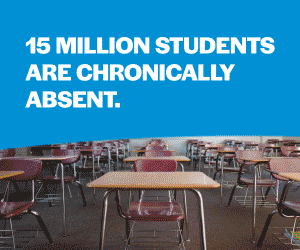 A teacher reads to a group of students at Andrew Hamilton school. A new report found that teachers in their first three years of teaching and teachers of color leave their jobs at higher rates than others. (Carly Sitrin/Chalkbeat)
A teacher reads to a group of students at Andrew Hamilton school. A new report found that teachers in their first three years of teaching and teachers of color leave their jobs at higher rates than others. (Carly Sitrin/Chalkbeat)
A new report by a coalition of local education-focused groups has found an alarming level of teacher attrition in Philadelphia district and charter schools, a trend especially true for teachers who are nonwhite and have fewer than three years experience.
Describing an “urgent need to accelerate efforts to retain newer teachers and teachers of color,” the report, compiled by the Philadelphia Talent Coalition and led by Elevate 215, lays out several strategies for improvement. They include higher starting salaries, helping new employees pay off their student loans, more mentoring and coaching of new teachers, and building “welcoming and supportive” school cultures.
“The reason why this is so important is that research shows most of the time teacher attrition has a negative impact on student learning,” said Ed Fuller, the Penn State professor whose research contributed to the report’s conclusions. “It’s harder to build strong, safe and welcoming communities when you turn over people quickly.”
Schools rely on building relationships of trust between students and teachers and students “need to know there is somebody in school who cares about them, and that is hard to establish when you lose teachers all the time,” he said.
Turnover also results in high levels of emergency certified teachers – those who have not completed all the coursework and requirements to become fully qualified in their field. In the Philadelphia school district, one in five teachers are not fully qualified; in charter schools, the percentage is closer to one in four.
The release of the report comes as the district and the Philadelphia Federation of Teachers are negotiating a new contract. In August, the two sides decided to extend the current contract for one year.
In a statement, PFT president Art Steinberg called recruitment and retention of teachers “a long-standing problem for the district, which shouldn’t need another report to know that improving pay, work environment and professional support are the solutions. It’s not yet Halloween and we’re already seeing teachers and staff quitting out of frustration with their working conditions, which tragically comes at the expense of students deserving of stability and consistency throughout the school year.”
He added he was “heartened” that key district leadership “appear to understand that stronger compensation as well professional development and support must be a priority in our members’ new labor contract.”
The PFT is not an official member of the talent coalition.
Among the report’s findings:
- Of teachers hired in 2017, just 55% were still working in 2022-23 in district schools, while more than half of those working in charter schools left by then.
- The percentage and number of teachers of color in Philadelphia public schools are increasing, but they leave at greater rates than white teachers.
- While two-thirds of the teachers employed in Philadelphia work for the school district, as opposed to in charter schools, charter schools employ a higher proportion of teachers who have just one to three years of experience. Nearly 1,800 of the 3,200 people in their first three years of teaching in Philadelphia during the 2023-24 school year worked in charter schools.
- Charter schools have a slightly higher percentage of teachers of color than district schools.
- The pandemic had a big effect on teacher retention in Philadelphia. While teachers for the most part stayed during the virtual year in 2020-21, attrition spiked the year after that, especially among new teachers, those teaching in charter schools, and nonwhite teachers.
The data also dispel the myth that teachers who leave Philadelphia do so for better-paying jobs in better-paying suburban districts. By contrast, most of the teachers who left their jobs in 2022-23 left education altogether.
“We hear that teachers leaving are going to the suburbs, but that’s not true to what the data says,” said Scott Gaiber, Elevate 215’s deputy chief of talent initiatives, in an interview. “It’s important to debunk that notion. The main issue is people leaving the teaching profession entirely.”
Read the full story on Chalkbeat Philadelphia.



























